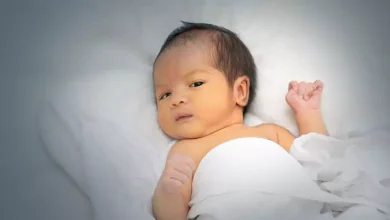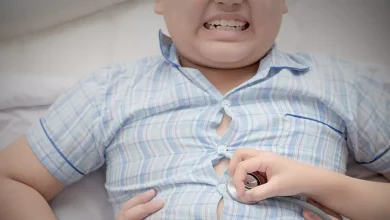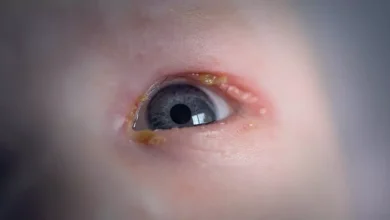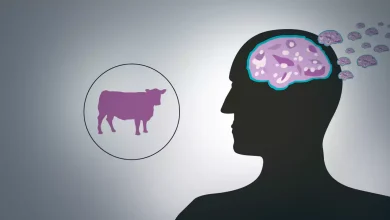All about Acne
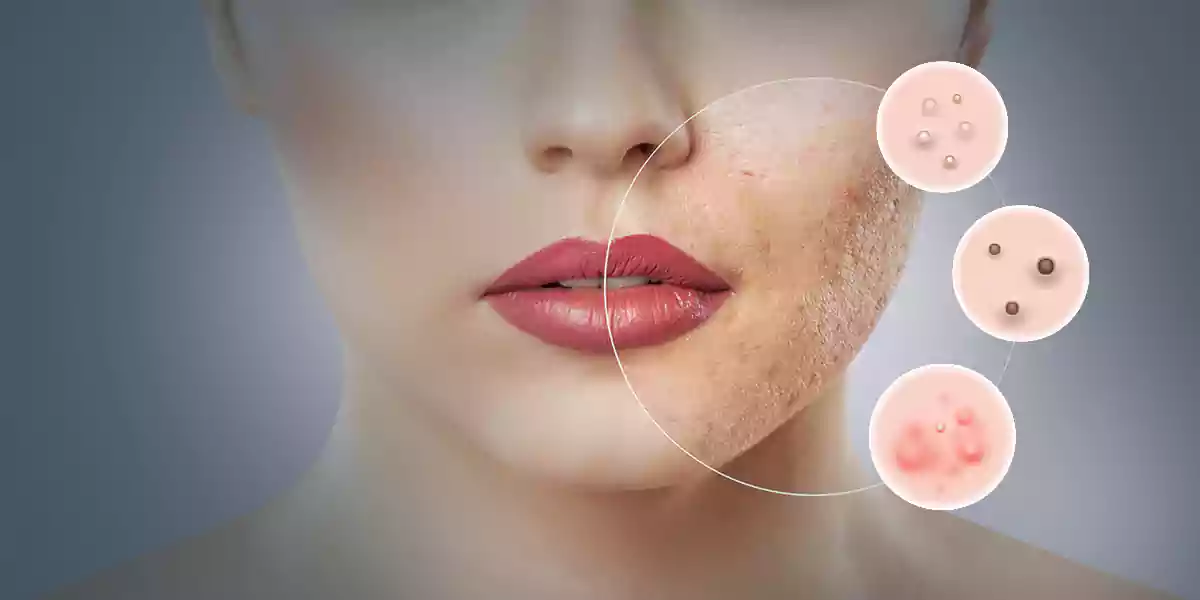
What is Acne?
Acne is a type of recurring or chronic skin disease that occurs mostly on the face where the pores (hair follicles) of the skin clog up and can become inflamed. Acne mostly occurs in the face and forehead but sometimes it affects the forehead, chest, shoulders, and upper back also. Based on the severity, it can lead to other skin conditions like blackheads, pimples, knots, and scars. It affects everyone at least once in a lifetime mostly between the age of 10 to 30. Men are mostly affected by it during the puberty period while it affects women in adulthood. It’s a very common skin disease during adolescence and the early phase of adulthood.
What are the different types of acne?
There are seven types of acne. They include:
- Blackheads: It occurs when bumps on the skin are filled with surplus oil and dead skin. It seems like some dirt entered the bump, but in reality, it looks like that because of uneven light reflection off the blocked follicle.
- Whiteheads: When the bumps are closed with oil and dead skin, whiteheads occur in that particular area.
- Papules: These are the small red or pink bumps that occur because of inflammation.
- Pustules: If pimples have puss on them it’s called Pustules They look like whiteheads surrounded by red rings. They can cause scarring if picked or scratched.
- Fungal acne (pityrosporum folliculitis): This is itchy and inflamed acne that occurs when excessive yeast grows in the hair follicles.
- Nodules: Solid pimples located deep in your skin. They are large and painful.
- Cysts: Pus-filled pimples. These can cause scars.
What are the causes of acne?
Acne is a very common skin ailment during adolescence which usually fades away with age. Pimples a type of acne occur when a group of hormones known as androgens causes an upsurge in sebum production on the skin. Blackheads also known as comedones are formed when dead skin cells and sebum block the pores of the skin. One more cause of acne is a type of bacteria that colonizes and creates pores, which can cause an inflammatory reaction that results in Cutibacterium acne or propionibacteria. It activates the immune system and the inflammatory cells migrate toward the affected area which leads to the formation of a painful and swollen pimple.
Apart from hormonal changes during adolescence and the early phase of adulthood, there are a few more causes of acne which can occur during adulthood also:
- Using greasy cosmetics, soaps, and hair products.
- Some medicines
- Metabolic diseases
- Menstrual cycle
- Sunlight worsens acne
- Climatic conditions
- Stress Pollution
- Obesity
- Food mostly dairy products can give rise to acne in some people
What are the Symptoms of Acne?
The typical symptoms of acne are visible blackheads, pimples, or any type of acne mostly on the face but sometimes it may occur in other parts of the body also. Some important symptoms of acne are: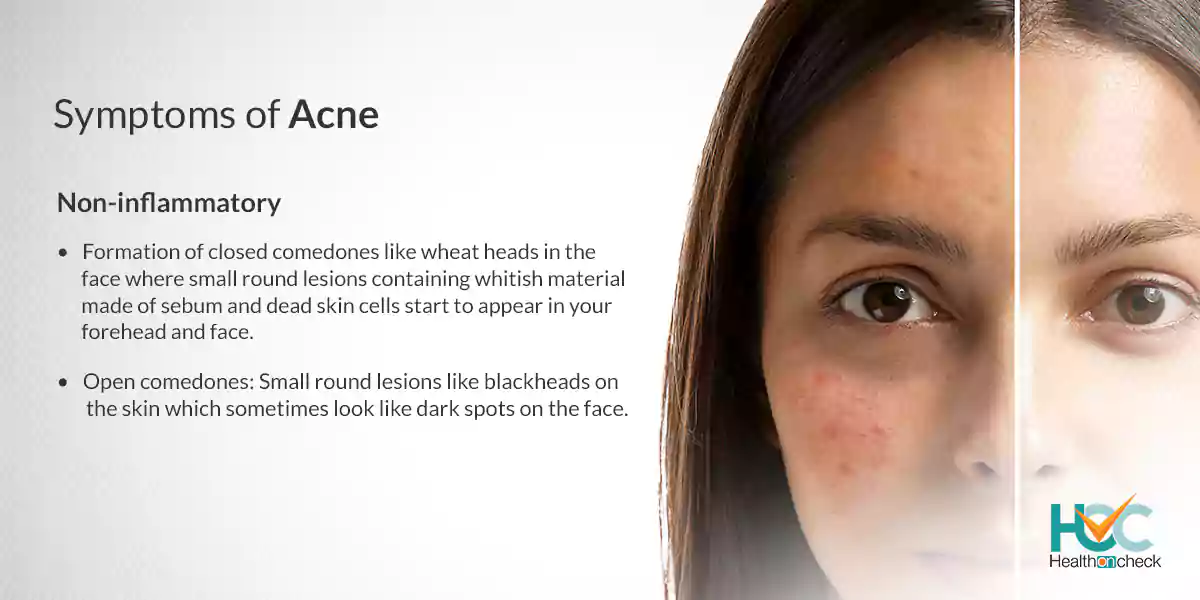
Non-inflammatory: Formation of closed comedones like wheat heads in the face where small round lesions containing whitish material made of sebum and dead skin cells start to appear in your forehead and face.
- Open comedones: Small round lesions like blackheads on the skin which sometimes look like dark spots on the face.
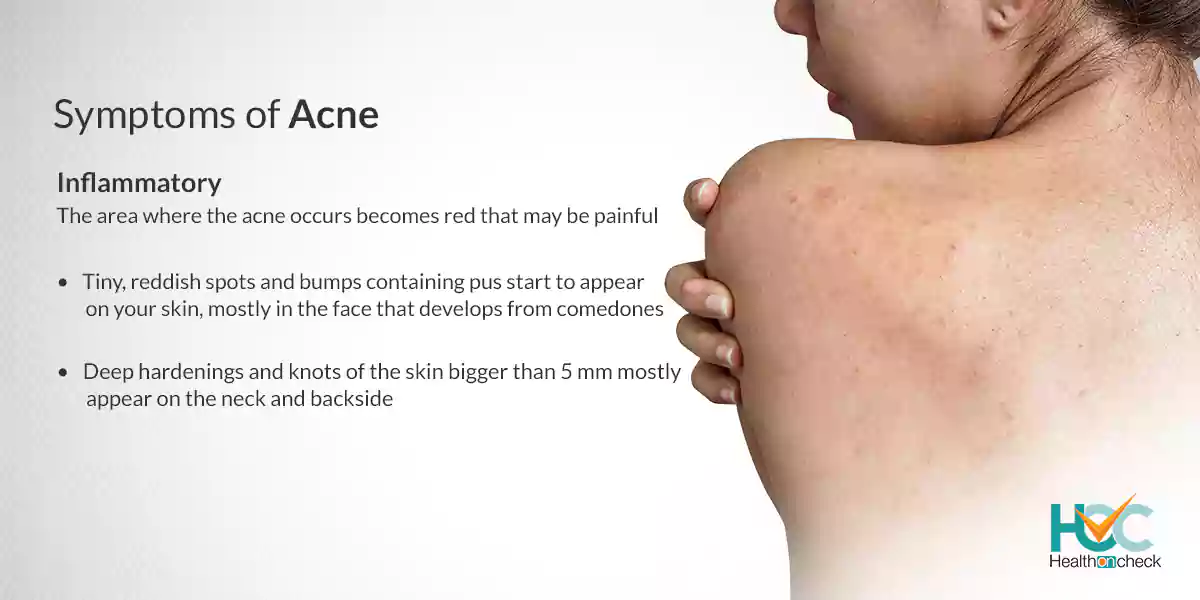
Inflammatory: The area where the acne occurs becomes red that may be painful
- Tiny, reddish spots and bumps containing pus start to appear on your skin, mostly in the face that develops from comedones
- Deep hardenings and knots of the skin bigger than 5 mm mostly appear on the neck and backside
How is Acne Diagnosed?
If you notice the occurrence of small spots on your skin, mostly on the forehead and face which may pain also, it’s an indication of acne. Visit a dermatologist who can diagnose acne through skin examination as sometimes what looks like acne may not be acne but other skin conditions such as perioral dermatitis or hidradenitis suppurativa whose treatments are different from the treatment of acne. They may perhaps ask if you’re undergoing significant stress if you have a family history of acne or just had periods (in the case of girls and women) all of which are risk factors. Sudden, severe acne outbreaks in older people can be symptoms of some other underlying disease that may need medical attention.
Most of the time acne fades away with time but in case it becomes severe, visits a dermatologist who will examine the acne thoroughly and prescribe treatment accordingly.
What Are The Treatment Options For Acne?
The treatment of acne depends on the severity, age, type of acne, etc., and most of the time acne fades away or some mild lotion or skin cream for acne is used to treat it but if the acne is not going off its own and the normal skin lotions are not effective, your dermatologist may use other medications and therapies to treat acne.
Medication in form of gels and lotions to be applied on the skin:
- Benzoyl Peroxide: Benzoyl peroxide is available as a face wash and leave-on gel which is an over-the-counter product like Clearasil, Stridex, and PanOxyl. It kills the bacteria that cause and intensifies acne. It is quite an effective medication helpful to cure acne.
- Salicylic Acid: It is available as a cleanser or lotion that is useful to remove the top layer of damaged skin. Salicylic acid liquefies dead skin cells to avert the hair follicles to get clogged.
- Antibiotics: Antibiotics are available in the form of a lotion that effectively reduces the inflammation caused by the bacteria responsible for acne
- Retinoids: It’s a vitamin A derivative that is used to cure blackheads and whiteheads while preventing clogged pores, one of the main reasons for acne. Apply it on the whole area near the acne and not only in the spot of acne because it helps in preventing the formation of new acne. Irritation on the applied area is a side effect of Retinoids but goes away with time.
- Dapzone (Aczone): It comes in the form of a gel with antibacterial properties that is used to treat inflamed acne. It’s should be applied to the affected area twice a day.
Medications that are taken orally :
- Antibiotics: There are antibiotics available that are taken orally to cure moderate to severe acne especially tetracycline antibiotics like minocycline and doxycycline.
- Contraceptives: Contraceptives are used to treat acne problems among girls and women if acne appears during the mensuration period or pregnancy. Birth control pills with a combination of estrogen (the primary female sex hormone) and progesterone (a natural form of steroid that helps regulate menstruation) are prescribed which are quite useful to treat acne.
- Isotretinoin: It is an oral retinoid, which is quite an effective medicine used only for the most severe cases of acne. Isotretinoin compresses the size of oil glands, which is the main cause of acne formation.
If the acne is not cured even after using lotions and oral medicines which is very rare, other options such as steroids in the forms of injection, laser treatment, chemical peels, and even small surgery are used to treat a severe form of acne.
What are the Risk Factors Associated with Acne?
Acne has formed the pores of your skin and become blocked by hair, sebum (an oily substance), bacteria, and dead skin cells. Blackheads, whiteheads, nodules, and other types of pimples forms because of those blockages. Some risk factors of acne are: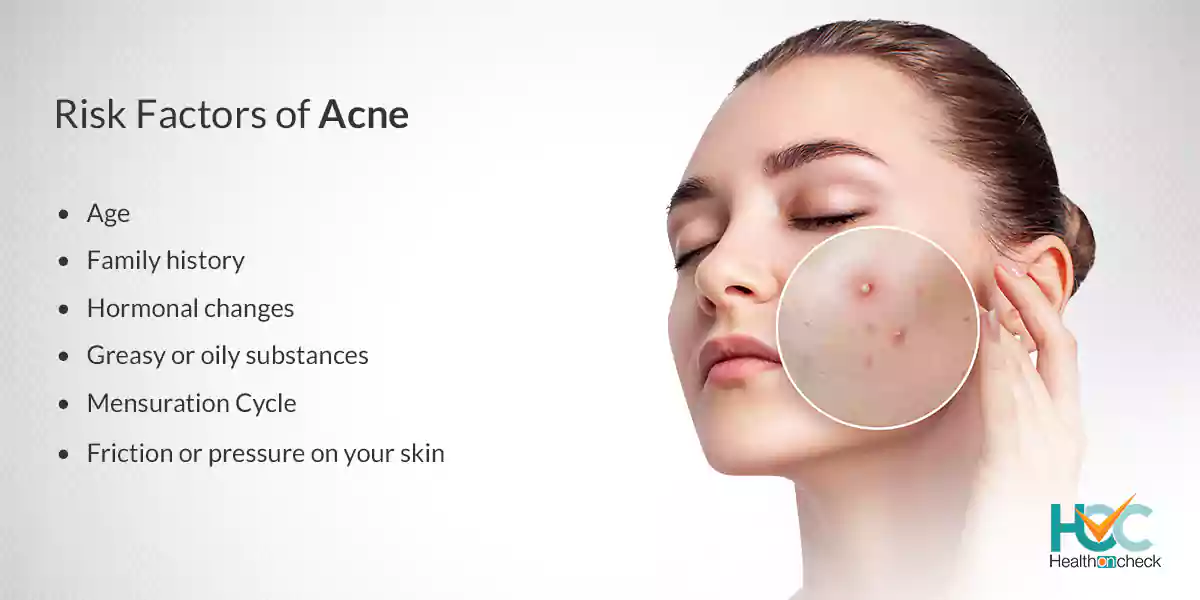
- Age: Acne appears mostly during the adolescence period, mostly among boys but people of all ages can get acne. Women get it after entering adulthood.
- Hormonal changes: Hormonal changes especially during puberty and pregnancy can result in acne.
- Family history: Genetics plays a role in acne. If your parents had acne, you’re likely to get it too.
- Greasy or oily substances: Using greasy and oily creams, lotions, etc. on the skin can also cause acne
- Friction or pressure on your skin: Things such as helmets, bra, underwear tight collars, and backpacks can increase the risk of acne when it pressurizes the skin.
- Mensuration Cycle: Girls and women are most likely to get acne during the mensuration period because of hormonal changes in the body.
What are the Complications of Acne?
Almost everyone at some point in his life, especially during puberty goes through a phase where acne occurs on the face and sometimes in other parts of the body also. It goes by itself after some time and does not have any long-term or serious problems in life. Even though it’s not a long-term or life-threatening disease, there are some complications that may arise because of acne.
- Scars: Scars are the most common complication of acne where the affected area may get the skin (acne scars) and thick scars (keloids) after the acne is healed. To avoid this, you shall not pick at your acne. Let it get healed by itself.
- Post-inflammatory Hyperpigmentation: After the acne is gone, the colour of the affected skin area may change to brown, pink, purple, or any other colour and this is called post-inflammatory hyperpigmentation. It usually looks like a stain on your skin which fades out with time. To help it fade quicker, use sunscreen or some lotion recommended by your doctor.
- Effects Self-Esteem: One major complication of acne is that it may affect the self-esteem of people who got acne, especially during their teenage age. Adolescence is the period where both boys and girls are quite concerned about how they look and acne mostly occurs on the face. It may result in low self-esteem as it’s normal to feel unattractive and insecure but one shall remember that acne is just a passing phase and mere acne does not make anyone unattractive. Be confident to face the world, acne or not.
Living with Acne
Acne is neither a long-term condition nor life-threatening nor one can lead a normal life while suffering from acne. But it may affect the affected people psychologically as it may lead to low self-esteem and even depression, especially among teenagers and women as acne may make someone feel unattractive. One should be mentally strong and understand that acne is just a passing phase and every person at least once in a lifetime suffers from it and it’s nothing serious.
Whom to Consult?
If you notice the occurrence of acne on your face and forehead, use lotions available in the market that are prescription free to cure them. Acne in teenagers mostly goes away in some time but in case it’s not going away, visit a dermatologist ( doctor specializing in skin-related problems) who will check the condition, type, and severity of your acne and prescribe treatment accordingly.

